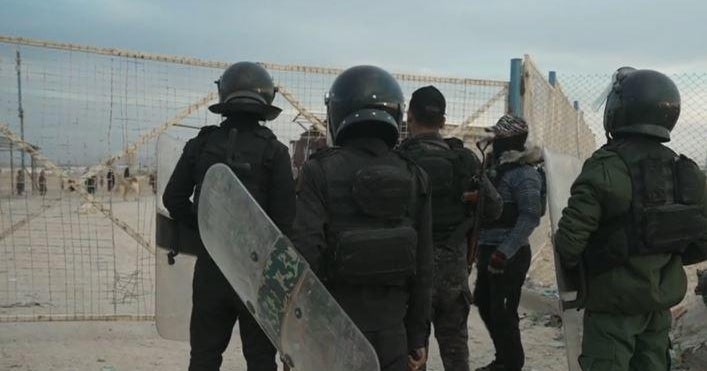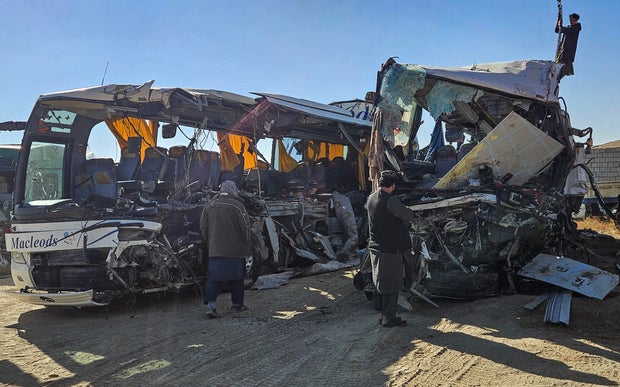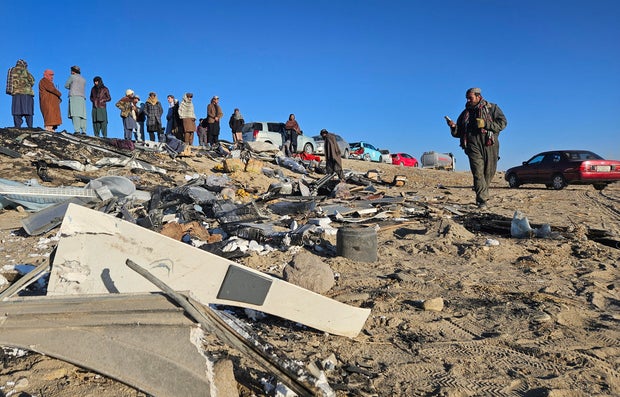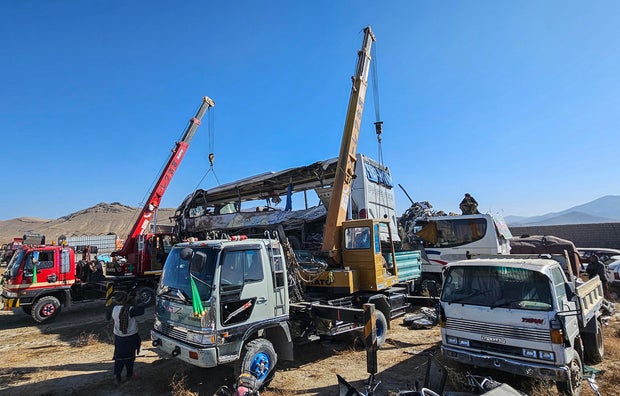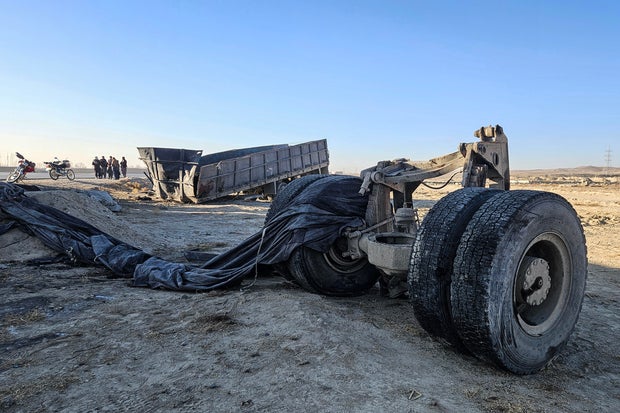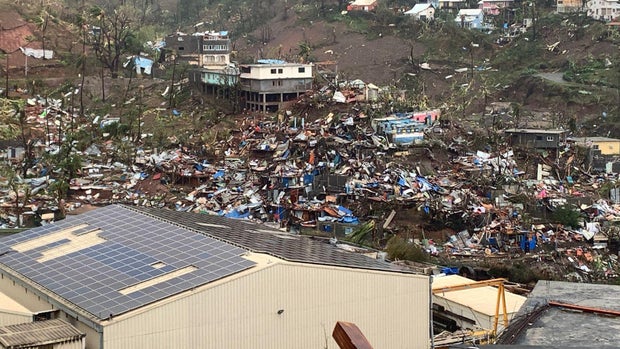CBS News
Nigeria hit by another mass kidnapping, with more than 300 now believed missing
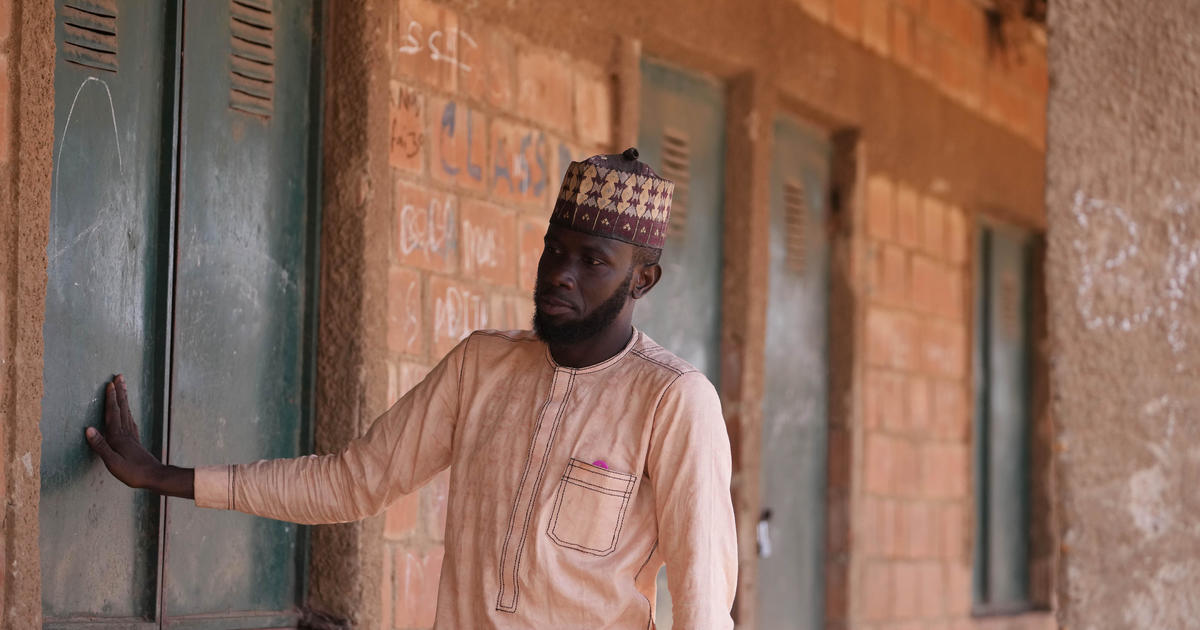
Kaduna, Nigeria — Gunmen have abducted dozens of people from a northwest Nigerian village, according to two local representatives and a United Nations source, just days after the kidnapping of more than 250 pupils from a school in the same state.
CBS News correspondent Debora Patta says armed groups, known locally as bandits, have wreaked havoc for years in northern Nigeria, where they target villagers, motorists on highways and students in schools, hoping to barter for ransom payments. The latest attack took place around midnight, with gunmen firing sporadically to scare residents in Kaduna state’s Kaiuri district.
It follows a similar pattern seen over the last couple weeks in remote communities across northern Nigeria, where there is little security and residents have been left feeling helpless.
Sunday Alamba/AP
The spate of recent abductions drew a warning from a regional security expert, who told CBS News’ producer Sarah Carter over the weekend that Nigerian security forces appeared to have lost control of the country.
Tuesday’s abductions in Kaiuri came as security forces searched for the pupils who were kidnapped last week from their school in Kuriga village, about 93 miles away in the same state. Before that, gunmen abducted another group of children early Saturday morning from a school in Sokoto, another state in northwest Nigeria.
Saturday’s was a smaller kidnapping, with about 15 children said to be missing, but it was the third incident reported in just a week following reports that as many as 300 internally displaced people had gone missing near a camp in the northeast state of Borno. The security expert, David Otto, told CBS News many of those individuals likely were not abducted, but rather chose to leave the grim situation in their IDP camp and return to the bush and, in many cases, to relatives aligned with the terror group Boko Haram.
The mass kidnappings come almost 10 years after Boko Haram militants triggered a huge international outcry in 2014 by abducting more than 250 schoolgirls from Chibok in Borno state. About 100 of them remain missing.
The series of large-scale abductions is challenging President Bola Ahmed Tinubu’s government, which promised to tackle insecurity while also managing a cost-of-living crisis and bringing more investment to Africa’s most populous nation.
Nigerian officials have not provided information on the Tuesday abductions in Kaiuru, but local councillor Abubakar Buda told Channels TV that gunmen stormed the village early in the morning, going house-to-house to kidnap residents and opening fire sporadically. Buda said a military intervention stopped more people from being kidnapped, according to Channels.
State lawmaker Usman Danlami Stingo told Arise News that 32 women and 29 men had been snatched.
A U.N. source, who was not authorized to speak publicly to the media, also told AFP that gunmen stormed the village early Tuesday morning and that “around 60” people were taken.
Former Nigerian Senator Shehu Sani told CBS News on Wednesday that the bandits would likely split up the people they seized to avoid drone detection while they negotiate with the government for ransom payments.
Nigeria’s criminal gangs know the families themselves don’t have money to pay for their loved ones’ return, but they’ve made a lucrative business out of abducting people for ransom anyway.
Kidnapping is illegal in Nigeria and carries a possible life sentence, but so is paying kidnappers ransom — officially, at least. Sani said the government would likely pay the ransom but not disclose any details of the negotiations or any payment made.
The gangs use ransom money to buy more weapons and expand their areas of operation.
AFPTV/AFP via Getty Images
Troops were still scouring forests in the northwest, meanwhile, in an effort to rescue the students kidnapped last week from Kuriga, but families have said they’ve been given little information since the abductions.
“We will continue praying for divine help in resolving this tragedy while the government takes up the issue with the kidnappers,” relative Muhammad Kabir told AFP on Wednesday.
On Tuesday, inspector-general of the national police force Kayode Egbetokun vowed to deploy officers across the state to “allay fears and build confidence of Kaduna residents, especially those in rural communities.”
CBS News
FAA bans drones over several New Jersey towns. See the list.

NEW YORK — Drones have been banned from flying over several New Jersey towns, the Federal Aviation Administration confirms to CBS News.
The FAA order covers nearly two dozen towns, including Jersey City, Harrison, Edison, Bayonne and Camden. It will be in effect until Jan. 17.
The order says no unmanned aircraft can operate below 400 feet within one nautical mile of the airspace specified in each area. Additionally, it allows the government to use “deadly force” against the drones if they pose an “imminent security threat.”
“Pilots of aircraft that do not adhere to the procedures in the national security requirements for aircraft operations contained in this section may be intercepted, and/or detained and interviewed by federal, state, or local law enforcement or other government personnel,” the order reads in part.
Several of the zones are centered around infrastructure, like power substations. Others cover areas like the Kearny, New Jersey port and airspace around military installations like Joint Base McGuire-Dix-Lakehurst in South Jersey, or airports such as Newark-Liberty International Airport.
Earlier this month, the Florham Park, New Jersey police chief told residents drone sightings had been reported above “water reservoirs, electric transmission lines, rail stations, police departments, and military installations.”
Where are drones banned in New Jersey?
North Jersey:
- Cedar Grove
- Bridgewater
- North Brunswick
- Metuchen
- South Brunswick
- Edison
- Branchburg
- Sewaren
- Jersey City
- Harrison, Essex County
- Elizabeth
- Bayonne
- Clifton
- Kearny
Central Jersey:
South Jersey:
- Burlington
- Evesham
- Camden
- Gloucester City
- Westampton
- Winslow
- Hancocks Bridge, Salem County
See the full order from the FAA here.
Mysterious drones over New Jersey and beyond
Drones sightings have been reported all month long, first over Morris County, New Jersey and then over several other East Coast states.
Federal, state and local officials have been demanding more information about where they are coming from and what’s being done to stop them. The FBI is leading the investigation and tells CBS News it has received thousands of tips.
While the White House says there is no known threat, New Jersey Gov. Phil Murphy recently sent a letter to President Joe Biden asking for more federal resources.
On Wednesday, a push from Sen. Chuck Schumer to give local law enforcement more ways to track drones was blocked in the Senate.
Check back soon for the latest updates on this developing story.
contributed to this report.
CBS News
2 bus crashes in Afghanistan leave dozens dead, dozens more hurt

Two highway crashes in southeastern Afghanistan killed a combined total of 50 people and injured 76, a government spokesman said Thursday.
One was a collision between a bus and an oil tanker on the Kabul-Kandahar highway late Wednesday, said Hafiz Omar, a spokesman for the governor of Ghazni province.
The other, also late Wednesday and in the same province, was in a different area of the same highway, which connects the Afghan capital with the south.
MOHAMMAD FAISAL NAWEED / AFP via Getty Images
Hamidullah Nisar, the provincial head of the Taliban-run Information and Culture Department, told the Reuters news agency the other accident involved a cargo truck, adding that some of those injured in both collisions were in critical condition.
Omar said many of the injured were taken to hospitals in Ghazni and patients in more serious condition were transferred to Kabul. Women and children were among the casualties, he said.
Authorities were in the process of handing over the bodies to families, Omar said.
MOHAMMAD FAISAL NAWEED / AFP via Getty Images
Crash survivor Abdullah Khan, who was being treated in a Ghazni hospital, said he didn’t know how many people had either died or were injured.
“I got out from the bus myself and heard the sound of moaning. There was blood everywhere. Some people had head injuries and others had hurt their legs.”
MOHAMMAD FAISAL NAWEED / AFP via Getty Images
Traffic accidents are common in Afghanistan, mainly due to poor road conditions and driver carelessness.
MOHAMMAD FAISAL NAWEED / AFP via Getty Images
CBS News
France’s President Emmanuel Macron tours cyclone-battered Mayotte, meets survivors pleading for help

Mamoudzou, Mayotte — France’s President Emmanuel Macron traveled Thursday to the Indian Ocean archipelago of Mayotte to survey the devastation that Cyclone Chido wrought across the French territory as thousands of people tried to cope without bare essentials such as water or electricity.
“Mayotte is demolished,” an airport security agent told Macron as soon as he stepped off the plane.
The security agent, Assane Haloi, said her family members, including small children, are without water or electricity and have nowhere to go after the strongest cyclone in nearly a century ripped through the French territory of Mayotte off the coast of Africa on Saturday.
KWEZI/AFP/Getty
“There’s no roof, there’s nothing. No water, no food, no electricity. We can’t even shelter, we are all wet with our children covering ourselves with whatever we have so that we can sleep,” she said, asking for emergency aid.
Macron got a helicopter tour of the damage and was to spend Thursday night on the far-flung French territory. After flying over the destruction, he headed to the hospital in Mamoudzou, Mayotte’s capital, to meet medical staff and patients.
Wearing a traditional Mayotte scarf on his white shirt and tie, sleeves rolled to the elbows, the French president listened to people asking for help. A member of the medical staff told him some people hadn’t had a drink of water for 48 hours.
Some residents also expressed agony at not knowing about those who have died or are still missing, partly because of the Muslim practice of burying the dead within 24 hours.
LUDOVIC MARIN/POOL/AFP/Getty
“We’re dealing with open-air mass graves,” Mayotte lawmaker Estelle Youssoufa told reporters. “There are no rescuers, no one has come to recover the buried bodies.”
Some survivors and aid groups have described hasty burials and the stench of bodies.
Macron acknowledged that many who died hadn’t been reported. He said phone services will be repaired “in the coming days” so that people can report their missing loved ones.
French authorities have said at least 31 people died and more than 1,500 people were injured, more than 200 critically. But it’s feared hundreds or even thousands of people have died in total.
Abdou Houmadou, 27, said emergency aid was needed immediately, not Macron’s presence.
“Mr. President, what I’d like to tell you… is I think the spending you made from Paris to Mayotte would have been better spent to help the people,” he said.
Another resident, Ahamadi Mohammed, said Macron’s visit “is a good thing because he’ll be able to see by himself the damage.”
“I think that we’ll then get significant aid to try and get the island back on its feet,” the 58-year-old said.
LUDOVIC MARIN/POOL/AFP/Getty
Macron’s office said four tons of food and medical aid, as well as additional rescuers, were aboard the president’s flight. A navy ship was due to arrive in Mayotte on Thursday with another 180 tons of aid and equipment, according to the French military.
People living in a large slum on the outskirts of Mamoudzou were some of the hardest hit by the cyclone. Many lost their houses, some lost friends.
Nassirou Hamidouni sheltered in his house when the cyclone hit.
His neighbor was killed when his house collapsed on him and his six children. Hamidouni and others dug through the rubble to reach them.
The 28-year-old father of five is now trying to rebuild his own house, which was also destroyed.
He believes the death toll is much higher than what’s officially being reported, given the severity of what he lived through.
“It was very hard,” he said.
Mayotte, located in the Indian Ocean between mainland Africa’s east coast and northern Madagascar, is France’s poorest territory.
The cyclone devastated entire neighborhoods and many people ignored the warnings, thinking the storm wouldn’t be so extreme.
Mayotte has more than 320,000 residents according to the French government. Most are Muslim and French authorities have estimated another 100,000 migrants live there.
Mayotte is the only part of the Comoros archipelago that voted to remain a part of France in a 1974 referendum.
Over the last decade, the French territory has seen a massive influx of migrants from the neighboring islands – the independent nation of Comoros, which is one of the world’s poorest countries.









